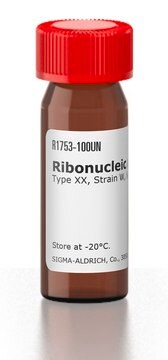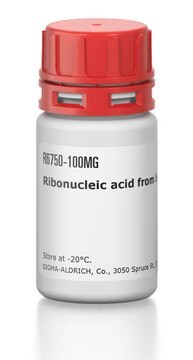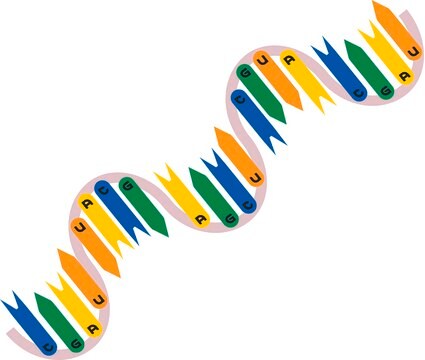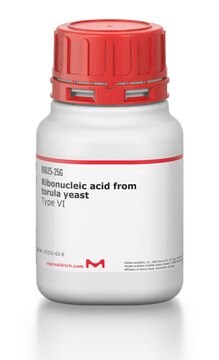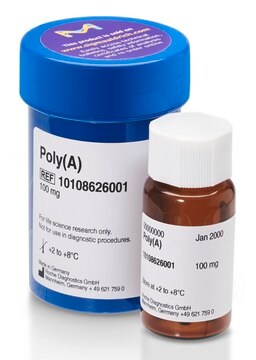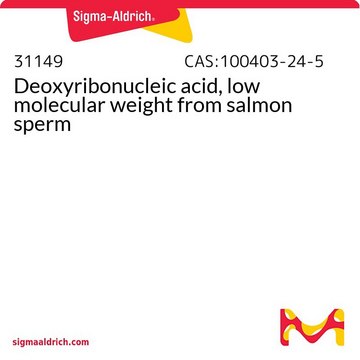R8508
Ribonucleic acid, transfer from baker′s yeast (S. cerevisiae)
buffered aqueous solution
Synonym(s):
Transfer RNA, tRNA
Sign Into View Organizational & Contract Pricing
All Photos(1)
About This Item
Recommended Products
grade
for molecular biology
Quality Level
form
buffered aqueous solution
concentration
9-11 mg/mL
foreign activity
DNase, Nickase, none detected
shipped in
dry ice
storage temp.
−20°C
Looking for similar products? Visit Product Comparison Guide
General description
Transfer RNA (tRNA) is isolated from baker′s yeast.
Transfer RNA (tRNA) is a short nucleotide RNA chain, which has an L-shaped structure.
Application
Ribonucleic acid, transfer from baker′s yeast (S. cerevisiae) has been used to precipitate mRNA of denuded oocytes and for reverse transcription. It has also been used to seal magnetic beads in RNA pull-down assay of nasopharyngeal carcinoma (NPC) cells.
Ribonucleic acid, transfer from baker′s yeast (S. cerevisiae) is suitable for use as a carrier in nucleic acid purification and precipitation.
Biochem/physiol Actions
Transfer RNA (tRNA) acts as an ‘adaptor′ molecule that translates the three-nucleotide codon sequence in the mRNA to the corresponding amino acid of that codon. It determines the genetic code by linking amino acids and nucleic acids. tRNA is involved in viral replication, bacterial cell wall biosynthesis, cell stress response, and animal behavior control. Aberrations in tRNA molecules are associated with several human diseases.
Components
tRNA is provided in a solution in 10 mM Tris HCl (pH 7.4) in 1 mM EDTA.
Storage Class Code
11 - Combustible Solids
WGK
WGK 3
Flash Point(F)
Not applicable
Flash Point(C)
Not applicable
Personal Protective Equipment
dust mask type N95 (US), Eyeshields, Gloves
Certificates of Analysis (COA)
Search for Certificates of Analysis (COA) by entering the products Lot/Batch Number. Lot and Batch Numbers can be found on a product’s label following the words ‘Lot’ or ‘Batch’.
Already Own This Product?
Find documentation for the products that you have recently purchased in the Document Library.
Customers Also Viewed
Patrick Lonergan et al.
Molecular reproduction and development, 66(3), 297-305 (2003-09-23)
In the cyclic cow, final maturation of the ovulatory follicle is initiated by the preovulatory luteinizing hormone (LH) surge. During the subsequent 24 hr period, the oocyte nucleus undergoes meiotic progression to metaphase II and several changes in cytoplasmic organization
Jean Lehmann et al.
Nucleic acids research, 41(10), 5494-5502 (2013-04-13)
The structure and function of conserved motifs constituting the apex of Stem I in T-box mRNA leaders are investigated. We point out that this apex shares striking similarities with the L1 stalk (helices 76-78) of the ribosome. A sequence and
Jin Chen et al.
Nature structural & molecular biology, 20(6), 718-727 (2013-04-30)
During translation elongation, the ribosome compositional factors elongation factor G (EF-G; encoded by fusA) and tRNA alternately bind to the ribosome to direct protein synthesis and regulate the conformation of the ribosome. Here, we use single-molecule fluorescence with zero-mode waveguides
Stefan Klumpp et al.
Proceedings of the National Academy of Sciences of the United States of America, 110(42), 16754-16759 (2013-10-02)
Bacterial growth is crucially dependent on protein synthesis and thus on the cellular abundance of ribosomes and related proteins. Here, we show that the slow diffusion of the bulky tRNA complexes in the crowded cytoplasm imposes a physical limit on
Tanja Kalstrup et al.
Proceedings of the National Academy of Sciences of the United States of America, 110(20), 8272-8277 (2013-05-01)
Atomic-scale models on the gating mechanism of voltage-gated potassium channels (Kv) are based on linear interpolations between static structures of their initial and final state derived from crystallography and molecular dynamics simulations, and, thus, lack dynamic structural information. The lack
Our team of scientists has experience in all areas of research including Life Science, Material Science, Chemical Synthesis, Chromatography, Analytical and many others.
Contact Technical Service

